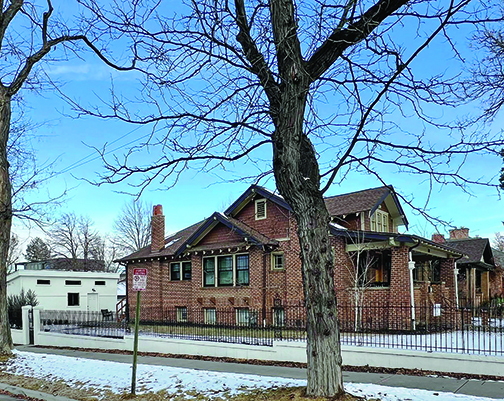
by Heather Brecl | Feb 19, 2024 | Main Articles
by Heather Brecl
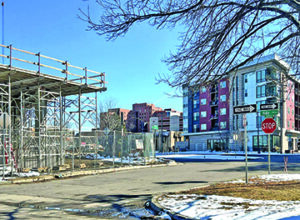
Overdevelopment: Neighbors argue that Hale neighborhood is already stressed by overdevelopment and apartments and does not need more ADUs.
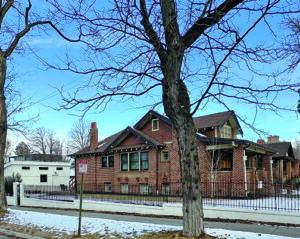
Back To The Future: Denver City Council eliminated Accessory Dwelling Units in 1954. They have raised their ugly head again as seen here at a home in Washington Park.
As the real estate market heats up this Spring, residents in Denver’s Hale neighborhood fear that new proposed rezoning laws regarding ADUs (Accessory Dwelling Units) will further accelerate unwelcome change in the neighborhood they love. And the concerns don’t stop with those residing in Hale — their neighbors in Mayfair, Hilltop, and Crestmoor Park see the impending loosening of regulations as the opening of floodgates for a myriad of problems that will devalue the historic neighborhoods that they hold near and dear to their hearts.
ADUs are a secondary structure or apartment that shares the lot with a larger primary home. They are built to provide additional and separate space for extended family members or to create income as a rental to offset mortgage costs. Often, they are apartments built above a garage, but can also include a finished basement used as separate living quarters. According to the City and County of Denver, Denver Zoning Code no longer has minimum lot size requirements for ADUs, though the size of the property does affect the size of a detached ADU and where on the property it can be.
Controversial District 5 Denver City Councilwoman Amanda Sawyer, a former California resident and CU Boulder grad, (serving Cherry Creek, Country Club, Hale, Hilltop, Lowry, Montclair, Washington-Virginia Vale, and Mayfair) is sponsoring the ADU rezoning efforts. Sawyer is already in hot water with her District 5 constituents over so-called traffic calming measures at 7th and Williams, and other locations which are causing traffic accidents (see Chronicle October 2023 edition’s front page “7th and Williams Fiasco”), and even a recent fatality. Sawyer believes that making ADUs easier to build in Hale will answer some of the affordability challenges that Denver buyers face.
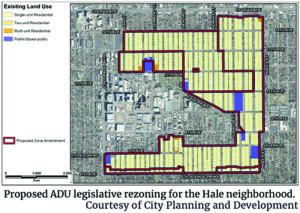
Proposed Rezoning: The areas highlighted in yellow and orange indicate lots subject to ADU redevelopment.
Members of the community in and around Hale see the addition of ADUs through a much different lens. According to residents in the surrounding neighborhoods, making ADUs a more accessible option for all homeowners in the area will destroy the character of their neighborhood and create irreparable damage in addition to the growing pains that are already facing. They fear that ADUs will be used as rentals to offset housing costs, creating a flood of trouble. With the slew of retail, restaurant, and entertainment venues that have been built in the Hale neighborhood near 8th and Colorado in the past few years, along with thousands of new residents that moved into the 9th+CO development, parking and congestion of traffic is already extremely formidable.
One Hale resident, who was granted anonymity to speak freely, has experienced first-hand the nightmare of having to find parking every night by her condo at 11th and Hale, even though she
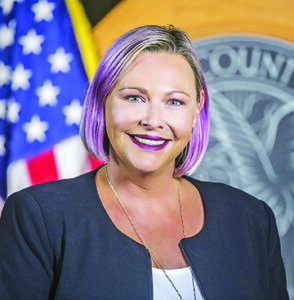
In Hot Water Again: Councilwoman Amanda Sawyer has stirred controversy once again by pushing the development of ADUs in the Hale neighborhood. Residents of other neighborhoods fear this is just the beginning of pernicious overdevelopment.
owns her own spot. The resident’s designated parking space is rarely available for her own use — recently she parked three blocks away and was robbed at gunpoint returning home from her car. With the congestion and overdevelopment comes a new nine-acre development site with housing that is going in where the old VA Hospital is. Residents have pointed out that there are multiple empty lots where development has stalled, and they have witnessed growing numbers of homeless people.
Many residents believe that the rezoning in Hale isn’t even needed in the neighborhood as there are enough vacant rentals available already. Many feel that most residents probably can’t afford to get a permit for an ADU let alone build it, so there is no reason to change the existing law for the ones who can. They propose that the passing of the measure is simply intended to create a snowball effect for Mayfair and Hilltop next. Of the 16,401 occupied housing units in Hale, 56.81% are owner-occupied, while 43.19% have renters living in them. (Source: point2homes.com). Councilwoman Sawyer confirmed that of those homeowners who qualify to have an ADU on their property, statistically only 1.5% choose to do so. This leads residents to wonder why the money and resources were spent to pass such a measure which affects so few.
Long-time Denver Realtor Denice Reich of Re/Max and area resident voiced grave concerns that the historic integrity of these neighborhoods is in danger with the proposed rezoning that she believes will follow suit in Hilltop and Crestmoor Park once fully approved in Hale. She noted that while the lots in Hale may be too small to fit the guidelines and setbacks required to build an ADU, the larger lots in the neighboring areas are prime territory for ADUs. She fears that what happened in Capitol Hill to a once stately neighborhood with some historic homes being preserved and others scraped and replaced with unsightly multi-family units could happen elsewhere if the legislation continues down this path.
Reich shared that in her experience in residential real estate property, home values drop with the increase of rental units and an
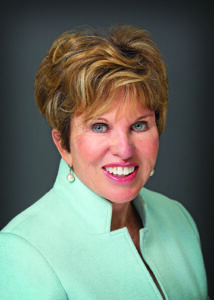
Neighborhood Champion: Denice Reich, Re/Max realtor, is one of the many voices fighting the rezoning efforts of Councilwoman Amanda Sawyer.
increased transient population in the area. In addition, she cited her fear of increased traffic on 13th and 14th Avenues, decreased parking, increased population density, and clogging access for emergency services (especially fire). Furthermore, Reich proposes that there will be detrimental problems stemming from the construction of ADUs near property lines, especially because of the relaxed guidelines for setbacks such as loss of the tree canopy, more non-permeable land for water to flood off, and more noise and dust from construction.
While Councilwoman Sawyer’s Office stands by the results of their community survey in which 58% for expressed support the rezoning for ADUs, while neighbors argue that the number lacks transparency and that the actual sample of those wanting the zoning changes is too small to represent how the overall community truly feels. According to the numbers provided by the Councilwoman’s Office, only 382 responses (representing 4% of the population in Hale) were received and only 212 were considered valid with a margin of error of 6.5%.
It remains to be seen what the overall impact of rezoning will actually be. As the landscape and city continues to change at rapid pace with both the construction of new residential homes and unending commercial development, the conversation continues to escalate leaving all sides seeking long-term solutions that will provide affordable and dependable futures.
The Hale ADU rezoning was passed on January 17, 2024, in a meeting of the Denver Planning Board and then again on February 6, 2024, during the meeting of the LUTI (Land Use, Transportation and Infrastructure) Committee. It will be the subject of a final public hearing with the full City Council scheduled for March 26, 2024. The rezoning will apply to over 1,500 properties.
The public can follow the legislative process and view documents submitted for City Council review at denver.legistar.com or denvergov.org.
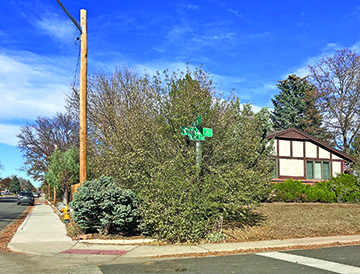
by Heather Brecl | Dec 15, 2023 | Main Articles
by Heather Brecl

Homeowners on corner lots in Denver will pay up to $350 per year more than most.
In case 2023 didn’t have enough in store for everyone, 2024 is on the path to deliver more. In November 2022 Denver voters narrowly passed a new citizen-led ballot initiative called Ordinance 307 resulting in an annual fee for sidewalk construction that is coming due in the new year. Homeowners in the city of Denver will have to get ready to add one more bill to the list of things to deal with as a homeowner. On top of the tripled property tax and now the bill for trash removal, residents of Denver will be assessed a new fee that was designed to fund a complete overhaul of the sidewalk system throughout the city. This initiative was spearheaded by the nonprofit organization called Denver Streets Partnership.
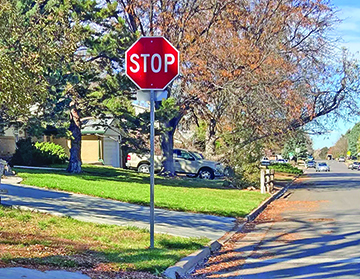
Whether or not homeowners actually have a sidewalk, they will be paying a fee to the City for the project for at least the next 10 years.
How much is the fee and how can residents figure out what it will be? The city of Denver created a tool that provided an estimate for homeowners. On average the fee will be around $108/year per household, however if a home is positioned on a street corner, the fee will in some cases be as high as $450 per year. Since the fee is assessed according to the linear footage that a property has along a city street, the longer the property boundary, the higher the fee will be. Unfortunately for residents trying to forecast expenses for the upcoming year, the pricing tool has been taken down from the Denver County website and the following notice is in place: “The city’s sidewalk task force is reviewing the sidewalk ordinance and may refine the current fee structure to ensure it is applied in a way that is as fair and reasonable as possible. DOTI (Department of Transportation and Infrastructure) has removed the sidewalk fee lookup tool it previously offered on this webpage while that assessment is underway.” The task force is scheduled to complete their evaluation by
July and levy the fees.
Denver resident Erin F. (last name withheld at her request) is outraged by the new sidewalk fee which for her will be over $450 per year since her home has what is now seen by her as the misfortune of being on a corner lot. Prior to the sidewalk tax, Erin appreciated her large lot that she and her son have enjoyed for years. She also takes on the responsibility of making sure that the sidewalk is always shoveled, even shoveling her elderly neighbor’s sidewalk during snowstorms. Even though Denver residents do not own actually own the sidewalk, it has been their responsibility to make sure it is cleared of snow in the required amount of time and that repairs done as needed.
With the new fee structure, the responsibility for sidewalk repairs and improvements shifts to the City of Denver. While this seems to lessen the burden of homeowners having to do expensive repairs themselves, many homeowners will in effect just be paying a sometimes exorbitant fee for sidewalks that may not ever need any repairs in their lifetime. It also leaves to question what the actual process will be to have any needed repairs done with no reasonable sense for a timeline as the process will be new from start to finish and will encompass the entire sidewalk network.
To Erin F. and many other homeowners, the new sidewalk fee seems anything but fair. “The new fee is a huge burden to people, on top of everything else that we have on our plates with a big increase in property taxes and now having to pay for trash too,” said Erin F. “People are going to lose their homes over this. I have no control over who uses my sidewalk but now suddenly I’m responsible for paying more than any of my neighbors to maintain it even though it was recently repaired and is in perfect condition. I don’t understand how anything about this fee is fair and equitable as the Denver Streets Partnership claims it is.”
Erin wants to know how the city plans on dealing with situations in which the homeowner is unable to afford the fee and if there will be any relief. She said that she has issued multiple complaints with the Partnership but has not gotten specific answers to her questions, and that the current policy only offers relief to certain neighborhoods.
Executive Director Jill Locantore of the organization that spearheaded the sidewalk effort responded to questions and concerns about the inequities of the assessed fee stating that “fair is a matter of opinion and perspective.” She explained that Denver has had an ongoing conversation for the past 20 years since the Webb administration about improving the sidewalk situation and the residents of Denver have spoken by voting for the ordinance. Locantore emphasized that the majority of Denver’s citizens voted to have safe sidewalks and it is her organization’s commitment to fulfill that mission, making sure that people have a safe way to walk through their neighborhoods and move about their communities. The City’s stakeholder committee is currently reviewing ways to tighten up the differences between the average fees assessed and the “outliers” such as those who own properties on long sidewalks and corners. She stated that they cannot make everyone happy but are making concerted efforts to make as many people happy as possible.
Overall, the Partnership, in conjunction with the City of Denver, estimates that a complete overhaul of the sidewalk system will cost upwards of $1 billion and will take up to 10 years to complete. Annually the fees will total approximately $40 million which is how much DOTI believes to be the cost of yearly maintenance. The additional funds will be raised from bonds.
Erin F. remarked that she will most likely never see any immediate benefit to the thousands of dollars in sidewalk fees that she will pay over the coming years as her sidewalk was just recently redone. On average, homeowners sell their homes after seven years which means that most will be in the same situation as Erin and will contribute to the sidewalk fund without ever directly reaping the benefits.
Homeowners may think that they will avoid being assessed the fee if there is no sidewalk but they are mistaken. The fee applies to all properties bordering a city street — whether or not a sidewalk actually exists. As is stated on the denvergov.org website, “(T)he requirement to pay the sidewalk fee is not dependent upon having a sidewalk or whether or not a property owner has recently completed installation or repairs. The fee is a revenue source to fund maintenance and repair projects and new sidewalk installations to connect people to places and services citywide.”
Furthermore, homeowners who think they refuse to pay the fee or cannot pay, will have a lien placed on their properties and the city will not be issuing any refunds or exemptions. Locantore did point out that certain discounts will be offered in the amount of 20% for real estate property located in neighborhoods which have been historically underfunded and are considered area of risk under the city’s NEST (Neighborhood Equity and Stabilization) program.
As a single mom who struggles to make ends meet, Erin F. hopes that the efforts of the City’s stakeholder committee gives earnest consideration to the concerns she has and others in the same boat.
For more information on the impending sidewalk fees, go to denversidewalks.com and devergov.org and look for Sidewalk Construction, Reconstruction and Repair.
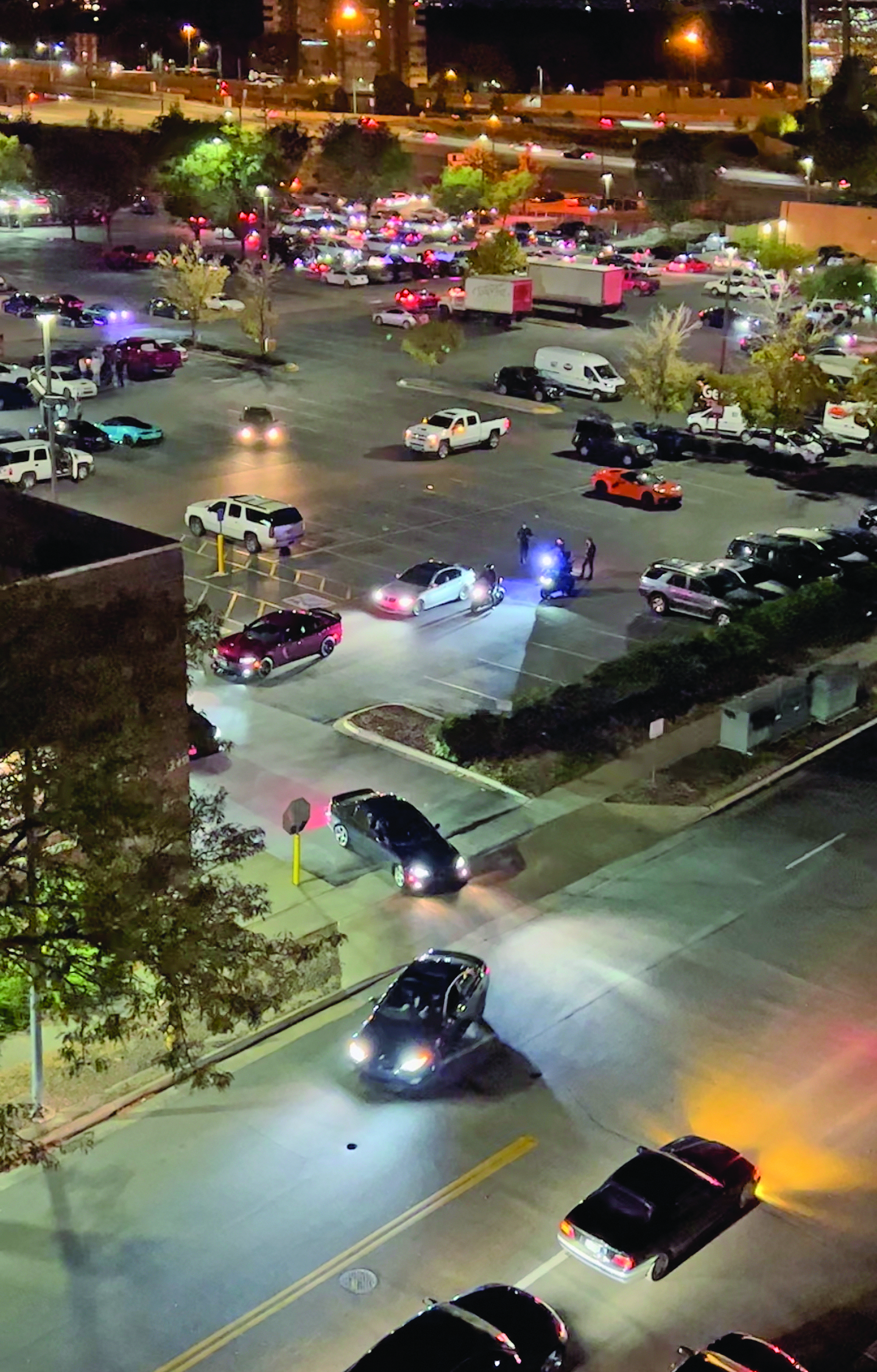
by Heather Brecl | Nov 16, 2023 | Main Articles
by Heather Brecl
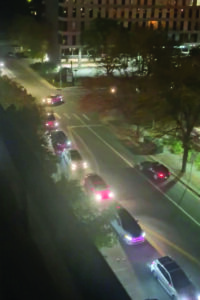
Noisy late-night car rallies in Denver parking lots in residential neighborhoods are causing residents to feel unsafe and unnerved at home.
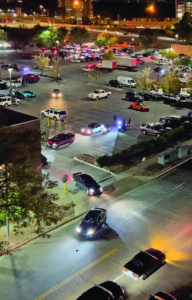
Loud mufflers and cars peeling out in a never-ending parade of people coming and going from the rally in front of residential buildings.
Denver residents living next to the big box store parking lots in Denver and Glendale are sadly familiar with sleepless nights caused by racecar rallies that seem to never end. Beginning long after dark and lasting until the wee hours, the loud and highly disruptive car rallies pop up monthly on a seemingly unexpected weekend night.
Unfortunately, these gatherings are becoming a more regular occurrence and are creating a sense of lawlessness, making residents fear for the safety of themselves and their loved ones returning home late at night. Denver resident Margaret W. (last name withheld upon request) lives in apartments that overlook the parking lot where Best Buy and Hacienda are located, at the corner of I-25 and Colorado Blvd. She said that her teenage daughter works at a local restaurant and often works the evening weekend shift. She is extremely fearful for her safety as she returns home from a long night’s work not knowing what she’ll encounter and cannot safely make her way up the street to the parking lot of their building.
From her balcony, she watched the cars screech both into and out of the parking lot circling up and down the street, completely ignoring any pedestrians walking by or residents trying to come and go in the neighborhood. So far, the police have been unable to do anything to stop the madness. “The people who gather at these rallies on nights when there is usually a big event somewhere downtown — they know that the cops won’t come since there are bigger problems to address,” said Margaret W. “They are getting braver, louder, and more reckless as the weeks go on. I’m getting to the point where I dread the weekends, knowing that there might be another rally.”
Glendale City Manager and attorney Chuck Line stated that “these late-night car rallies are examples of the general lawlessness created by the decriminalization of everything. They are just symptoms of the same disease. By decriminalizing things like shoplifting, people feel as if they can get by with whatever they want and they participate in behavior that they wouldn’t normally do. There just aren’t consequences anymore for doing the wrong thing.”
He recalled seeing gatherings of car enthusiasts that he saw posted in the neighborhood decades ago that were called “Coffee and Cars” with sanctioned gathering spaces. People who thought about peeling out for the thrill of it stopped doing it because they didn’t get by with the behavior. The late-night car rallies today teeter constantly on the edge of illegal behavior with reckless driving, noise violations, and endangerment of people living in these communities.
Margaret W. said there was yet another pop-up late night rally in the Best Buy parking lot with hundreds of cars, food trucks, and screeching tires as people slowly but steadily entered and then exited the lot lining up on East Mexico Avenue on their way back to I-25. Distressed and unable to fall asleep until 2 a.m., Margaret listened to the deafening music and roaring engines for over four hours, followed by the sounds of cars peeling out and racing one after the other onto I-25 headed northbound.
Discouraged and feeling helpless, Margaret has made countless calls to the non- emergency police number, hoping to get some peace back in her neighborhood where she has lived for over seven years. “I am very sad to see what is happening on a regular basis right across from my doorstep. I don’t feel safe anymore and wish I could do something to make the nonsense stop.” To her dismay, her calls to authorities have been fruitless and she has been unable to get any police presence to try and control the situation.
Line emphasized that the city is deeply committed to the welfare of their residents and community. “We are and will continue to be vigilant in responding to any calls we receive about these rallies and will take measures to do whatever we can to keep people safe. We encourage anyone witnessing these happenings and who have concerns to make calls to the non-emergency police number to report what they see and hear. Together we can get on top of this. If you feel like there is something illegal happening, please call.”
For local businesses, dealing with the rallies is a precarious situation. While they are not sanctioned by the businesses, the public is free to both park and gather in the parking lots. And certainly, not everyone participating in the car rally is engaging in criminal activity. This puts business owners in a difficult position as they do not want to discourage people who may be there just to stop or do business but want to make sure that their community remains a safe and welcoming place for their patrons.
Margaret W. remains hopeful that other residents will speak up letting authorities and business owners know how they feel so that her neighborhood will continue to be a place that she wants to call home.
The non-emergency police number for Glendale is 303-759-1511 and for Denver, dial 720-913-2000.











